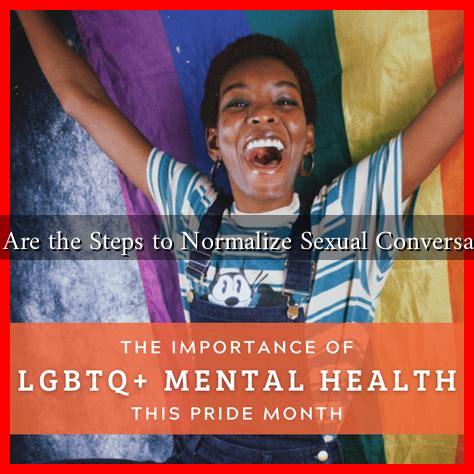-
Table of Contents
- What Are the Steps to Normalize Sexual Conversations?
- Understanding the Importance of Normalizing Sexual Conversations
- Step 1: Educate Yourself and Others
- Step 2: Create Safe Spaces for Discussion
- Step 3: Use Inclusive Language
- Step 4: Lead by Example
- Step 5: Advocate for Comprehensive Sexual Education
- Conclusion
What Are the Steps to Normalize Sexual Conversations?
In a world where sexual health and education are paramount, the ability to engage in open and honest conversations about sex is crucial. Normalizing sexual conversations can lead to healthier relationships, better sexual health outcomes, and a more informed society. However, many individuals still find it challenging to discuss sexual topics due to cultural taboos, misinformation, or personal discomfort. This article outlines the steps necessary to normalize sexual conversations, providing insights and strategies for individuals and communities alike.
Understanding the Importance of Normalizing Sexual Conversations
Before diving into the steps, it’s essential to understand why normalizing sexual conversations is vital. Research indicates that open discussions about sex can:
- Reduce stigma and shame associated with sexual health.
- Encourage safer sexual practices and reduce the rates of sexually transmitted infections (STIs).
- Promote consent and healthy relationships.
- Enhance sexual satisfaction and intimacy among partners.
According to a study published in the Journal of Sex Research, individuals who engage in open discussions about sex report higher levels of sexual satisfaction and lower levels of anxiety related to sexual performance.
Step 1: Educate Yourself and Others
The first step in normalizing sexual conversations is education. Knowledge is power, and understanding sexual health, consent, and relationships can empower individuals to speak openly. Here are some ways to educate yourself and others:
- Read books and articles on sexual health and education.
- Attend workshops or seminars focused on sexual wellness.
- Follow reputable organizations, such as Planned Parenthood or the American Sexual Health Association, for resources and information.
By becoming informed, you can dispel myths and provide accurate information in conversations, making discussions more productive and less awkward.
Step 2: Create Safe Spaces for Discussion
Creating an environment where individuals feel safe to express their thoughts and feelings about sex is crucial. This can be achieved through:
- Establishing ground rules for discussions, such as confidentiality and respect.
- Encouraging open dialogue in schools, workplaces, and community centers.
- Utilizing anonymous question boxes or online forums to allow individuals to ask questions without fear of judgment.
For example, some schools have implemented peer-led sexual health education programs that create a safe space for students to discuss their concerns and questions openly.
Step 3: Use Inclusive Language
Language plays a significant role in how we discuss sexual topics. Using inclusive and non-judgmental language can help normalize conversations. Consider the following tips:
- Avoid slang or derogatory terms that may alienate individuals.
- Use gender-neutral language to include all sexual orientations and identities.
- Be mindful of cultural differences and respect diverse perspectives on sexuality.
For instance, instead of saying “boys will be boys,” which perpetuates harmful stereotypes, one could say, “everyone is responsible for their actions,” promoting accountability and respect.
Step 4: Lead by Example
One of the most effective ways to normalize sexual conversations is to lead by example. When you openly discuss sexual topics, others may feel more comfortable doing the same. Here are some strategies:
- Share your experiences and knowledge in a respectful manner.
- Encourage friends and family to share their thoughts and feelings.
- Address misconceptions or discomfort when they arise in conversations.
By modeling open communication, you can inspire others to engage in similar discussions, creating a ripple effect in your community.
Step 5: Advocate for Comprehensive Sexual Education
Advocating for comprehensive sexual education in schools and communities is essential for normalizing sexual conversations. This education should cover:
- Consent and healthy relationships.
- Sexual orientation and gender identity.
- STI prevention and safe sex practices.
Research shows that comprehensive sexual education leads to healthier sexual behaviors among adolescents. For more information on advocating for sexual education, visit SIECUS: Sex Ed for Social Change.
Conclusion
Normalizing sexual conversations is a multifaceted process that requires education, safe spaces, inclusive language, leading by example, and advocacy. By taking these steps, individuals and communities can foster an environment where open discussions about sex are not only accepted but encouraged. The benefits of such normalization are profound, leading to healthier relationships, improved sexual health, and a more informed society. As we continue to break down the barriers surrounding sexual conversations, we pave the way for a future where everyone feels empowered to discuss their sexual health and well-being openly.

